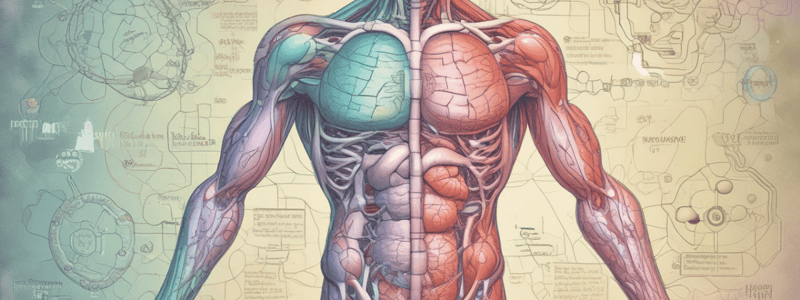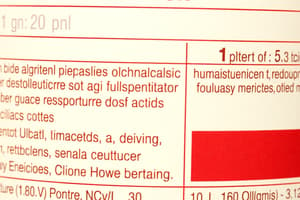Podcast
Questions and Answers
What is the primary function of carbohydrates, lipids, and proteins in the human body?
What is the primary function of carbohydrates, lipids, and proteins in the human body?
What is the primary fate of glucose in the brain during initial physical activity?
What is the primary fate of glucose in the brain during initial physical activity?
What is the function of GLUT molecules in glucose transport?
What is the function of GLUT molecules in glucose transport?
What is the primary advantage of storing glucose as glycogen?
What is the primary advantage of storing glucose as glycogen?
Signup and view all the answers
What is the primary hormone that initiates glycogenesis?
What is the primary hormone that initiates glycogenesis?
Signup and view all the answers
What is the primary function of hexokinase in glycogen synthesis?
What is the primary function of hexokinase in glycogen synthesis?
Signup and view all the answers
What is the primary regulator of glycogenolysis during short periods of fasting?
What is the primary regulator of glycogenolysis during short periods of fasting?
Signup and view all the answers
What is the primary difference between glycogen synthesis and glycogen degradation pathways?
What is the primary difference between glycogen synthesis and glycogen degradation pathways?
Signup and view all the answers
During lipolysis, what is the primary source of fatty acids released from adipocytes?
During lipolysis, what is the primary source of fatty acids released from adipocytes?
Signup and view all the answers
What is the primary function of beta-oxidation in the mitochondria?
What is the primary function of beta-oxidation in the mitochondria?
Signup and view all the answers
What is the role of AMPK in lipid metabolism?
What is the role of AMPK in lipid metabolism?
Signup and view all the answers
What is the site of lipogenesis in liver cells?
What is the site of lipogenesis in liver cells?
Signup and view all the answers
What is the primary energy source during periods of fasting and starvation?
What is the primary energy source during periods of fasting and starvation?
Signup and view all the answers
What is the effect of insulin on lipolysis?
What is the effect of insulin on lipolysis?
Signup and view all the answers
Which of the following enzymes is responsible for the synthesis of glycogen?
Which of the following enzymes is responsible for the synthesis of glycogen?
Signup and view all the answers
What is the outcome of glycogen storage disorders?
What is the outcome of glycogen storage disorders?
Signup and view all the answers
Which of the following hormones plays a role in the allosteric control of glycogen metabolism?
Which of the following hormones plays a role in the allosteric control of glycogen metabolism?
Signup and view all the answers
What is the incidence of glycogen storage disorders?
What is the incidence of glycogen storage disorders?
Signup and view all the answers
Which of the following is a characteristic of glycogen storage disorders?
Which of the following is a characteristic of glycogen storage disorders?
Signup and view all the answers
What is the consequence of a deficiency of glucose 6-phosphate in Von Gierke disease?
What is the consequence of a deficiency of glucose 6-phosphate in Von Gierke disease?
Signup and view all the answers
What is the purpose of glycolysis?
What is the purpose of glycolysis?
Signup and view all the answers
What is the role of phosphofructokinase in glycolysis?
What is the role of phosphofructokinase in glycolysis?
Signup and view all the answers
Study Notes
Nutrients of Human Metabolism
- Carbohydrates, lipids, and proteins serve as fuel molecules for the human body
- Absorbed end products of carbohydrates are monosaccharides, lipids are monoacylglycerol and long-chain fatty acids, and proteins are peptides
Carbohydrates
- Contain carbon, hydrogen, and oxygen atoms
- Primary source of energy is glucose, which has different fates depending on the body's needs
- Includes sugars, fruits, vegetables, fibers, and legumes
Glucose
- Most important fuel source for life
- Preferred energy source for the nervous system during initial physical activity
- Lack of glucose in the brain can lead to neurological issues
- Essential building block found in cell membranes, with small quantities stored
- Cannot enter cells by simple diffusion, requires GLUT molecules and insulin presence
- Glucose homeostasis requires a balance between glucose diffusion, storage, and metabolism
Storage of Glucose - Glycogen
- Glucose can be stored as glycogen, a polymer of glucose
- Efficient storage with minimal osmotic effect
- Liver can supply approximately 16 hours of glucose
- Muscle stores approximately 400g of glycogen
- Liver stores approximately 75g of glycogen
Glycogen Synthesis - Glycogenesis
- Initiated by the anabolic hormone insulin
- Hexokinase is an important enzyme
Glycogen Degradation - Glycogenolysis
- Provides glucose during short periods of fasting, between meals, and during sleep
- Regulated by glucagon and adrenal catecholamines epinephrine and norepinephrine
- Pathway is not a reversal of the synthetic pathway
Regulation of Glycogen Metabolism
- Synthesis: insulin activates glycogen synthase
- Degradation: regulated by glycogen phosphorylase
- Allosteric control from adrenaline, insulin, and glucagon hormones
Disorders of Glycogen Metabolism
- Incidence: 1 in 20,000 to 1 in 40,000
- Arise from deficiency or dysfunction of enzymes in glycogen metabolism
- Affects liver and/or muscle, leading to abnormal glycogen structure and excess glycogen storage
Glycogen Metabolism in Clinical Context
- Von Gierke disease: deficiency of glucose 6-phosphate enzyme, leading to accumulation of glucose-6-phosphate intracellularly
- 1 in 100,000 births, inherited as autosomal recessive traits
- Signs and symptoms: hypoglycemia, lactic acidosis, enlarged liver, and cerebral damage
Glycolysis
- Enzymatic catabolism of glucose into two pyruvate molecules and 2 ATPs
- Anaerobic metabolism of glucose, important during initial physical activity or limited oxygen availability
- Ten-step reaction, with rate-limiting enzyme phosphofructokinase
- Energy-requiring phase: two ATPs spent
- Energy-releasing phase: four ATPs produced
Gluconeogenesis
- Synthesis of new glucose from non-carbohydrate substrates such as lactate, pyruvate, glycerol, and alanine
- Occurs in the liver and kidney cortex
- Response to stress situations (e.g., fasting, starvation, prolonged exercise) under hormonal control
Lipid Storage
- Fatty acids stored primarily in adipocytes as triacylglycerol
- Triacylglycerol must be hydrolyzed to release fatty acids
- Triacylglycerols are highly calorific and efficient in producing energy
- Hormonal control:
- Insulin promotes storage
- Glucagon, adrenaline, cortisol, and GH promote mobilization
Lipolysis - Mobilization of Fatty Acids
- Adipocytes release triacylglycerol, which is broken down into glycerol and non-esterified fatty acids
- Regulation:
- Insulin inhibits HSL
- Epinephrine, norepinephrine, ACTH, and glucagon activate HSL
Fatty Acid Oxidation
- Beta-oxidation source of energy during periods of fasting and exercise
- Supply energy when glycogen and gluconeogenic precursors become scarce
- FA activates as FA-CoA derivative
- Occurs in the mitochondria
- 4 ATP per round - beta-oxidation is very efficient
Lipogenesis - Fatty Acid Synthesis
- Fatty acids synthesized from acetyl-CoA
- Requires ATP and NADPH
- Occurs in the cytoplasm of liver cells
- Acetyl-CoA comes from mitochondria via transport mechanism across mitochondrial membrane
Fatty Acid Synthesis/Lipid Storage
- AMPK is an allosteric regulator
Lipogenesis vs Lipolysis
- Opposite processes, with lipogenesis promoting fatty acid synthesis and lipolysis promoting fatty acid mobilization
Studying That Suits You
Use AI to generate personalized quizzes and flashcards to suit your learning preferences.
Related Documents
Description
This quiz covers the role of carbohydrates, lipids, and proteins in human metabolism, including their absorption and utilization as fuel molecules.




